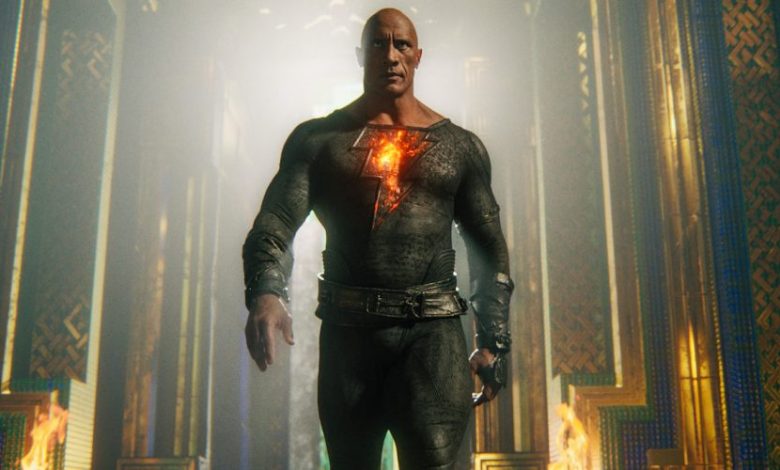Black Adam: The Next DCEU Flop

Charlie von Peterffy ‘24 / Entertainment Monthly Staff Writer
Even with its successful one-offs, the DC Extended Universe is crashing and burning. With every new movie, fans either hold on to hope for the future or have their dreams crushed because of the horrible quality. The franchise no longer depends on an overarching storyline like its MCU rival. Instead, it relies heavily on its star power and the mere existence of its characters to garner varying levels of success. Unfortunately, Black Adam, the newest DCEU installment, is not just a disappointment but a classic example of why the franchise needs restructuring. With a slow, thin narrative, poorly written characters, abysmal performances, and a lack of substance, Black Adam is one of the worst DCEU entries to date––although that’s not saying much.
Black Adam is about an ancient man from the fictitious region of Kahndaq, Black Adam (Dwayne “the Rock” Johnson), who receives the same powers as the DCEU’s Shazam. In ancient times, after obtaining these powers, he murdered Kahndaq’s governing powers in revenge for their killing his son. After thousands of years, in present-day Kahndaq, an archaeologist, Adrianna Tomaz (Sarah Shahi), finds Black Adam in a tomb and reawakens him so he can help stop an oppressive international regime called Intergang from oppressing her people and from getting the Crown of Sabbac. This ancient crown gives the wielder great power, equal to Adam’s powers. Unfortunately, Adam was never a hero, despite the legends of his taking down the last regime that tried to wield the crown. Throughout the movie, he must face what it means to be a hero and find the middle ground between what he knows best and what is morally acceptable. Whether or not he becomes a hero, he must help the descendants of his people, freeing them from oppression and stopping Intergang and other enemies from accessing near-limitless power.
The story is one-dimensional, entirely too predictable, and long. It throws viewers into mindless dialogue and dull action sequences with little to no emotional weight. Instead of building its story around its characters and focusing on the plot’s emotional impact, it gives viewers hollowly woeful sequences hoping to sway them. As a result, it has no substance, emotional resonance, or regard for proper storytelling structure Instead, it drags or sprints through different degrees of surface-level thrills and obvious implausibility. The story has a lot of potential, considering its roots in a grayer tone. However, it abandons these elements and style, utilizing the typical superhero formula––which it executes poorly.
The cast is okay but needs substantial upgrades. Johnson is uninspired, flat, and weak-willed throughout the whole film. His emotional range is highly restrictive; he constantly switches between a vaguely concerned vigilante and a violent anti-hero. There is no nuance or realism in his approach; everytime he speaks, he seems to be reading his lines from cue cards off screen. That is all he does for the entire film: he recites but does not react. Casting Johnson in the lead role is hugely problematic and should not have been authorized. The rest of the cast varies in terms of quality. Black Adam’s mortal compatriots, Tomaz, and her son, Amon Tomaz (Bodhi Sabongui), are even worse than Johnson. Shahi feels cartoonishly melodramatic. Whenever she appears on screen, she cranks her emotions up to a ridiculous degree. She comes off as flimsy and hammy in her reactions rather than a sturdy archaeologist with integrity. Sabongui is the worst of the bunch. He lacks facial expression, emotional range, and general likeability. Because of his poor skill, the most unbearable scene of the film is his motivational speech to the people of Kahndaq. It is dry, unsubstantial, and frankly stunted. The only entertaining component that some of these actors possess is comedic timing. The cast’s sense of humor really sells the film’s jokes. Unfortunately, there is not enough to justify these actors’ lack of appeal in everything else.
The older members of the Justice Society––Carter Hall/Hawkman (Aldis Hodge) and Kent Nelson/Doctor Fate (Pierce Brosnan)––are the only relatively enjoyable characters to watch. While the characters lack proper justification, explanation, and weight, they are funny, emotional, and relatable in ways the others miss. Unfortunately, their roles and everyone else’s are jarringly simple. No character in the film retains depth, intriguing journeys, interactive chemistry, or growth. Like the story, the characters fall into barren emotional sweeps and stock one-liners. Nothing is redeeming about these characters, so viewers cannot relate to or care about them. They feel ripped from a summary paragraph of their comic counterparts and pasted into the movie without any characteristic extrapolation.
The visuals are the best part of the movie. But, even then, its action scenes feel copied and unimportant, and its cinematography resembles past-DC director Zack Snyder’s style in an unfinished, unfocused fashion. The one exception is the movie’s CGI. Every digital creation looks and feels natural. With boundless detail, colorful imagery, and intriguing visual concepts, the film––whether by accident or not––presents incredible visual thrills. But unfortunately, these visuals are insufficient in combating the rest of the film’s major cinematic weaknesses.
Overall, Black Adam is another failure in superhero filmmaking for DC. Not only does it fail to convince viewers of its realism and characters, but it also walks a thin line between being dull and laughably stupid in its writing. Everything about this movie feels like it should have stayed in the idea room. Do not watch this film. Do not give DC money for this horrific catastrophe. You might enjoy it if you only want mindless action and laughs, but only if you are a viewer seeking low-quality stimulation.